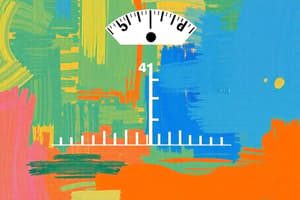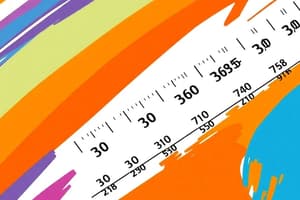Podcast
Questions and Answers
Which method is used to solve for an unknown quantity (x) in drug calculations?
Which method is used to solve for an unknown quantity (x) in drug calculations?
- Conversion Factors
- Ratio Proportion
- Desired Over Have or Formula Method (correct)
- Dimensional Analysis
Which of the following is NOT one of the primary methods for calculating medication dosages?
Which of the following is NOT one of the primary methods for calculating medication dosages?
- Desired Over Have or Formula Method
- Ratio Proportion
- Dimensional Analysis
- Conversion Factors (correct)
What is the purpose of using conversion factors in drug calculations?
What is the purpose of using conversion factors in drug calculations?
- To convert units of measurement (correct)
- To check the accuracy of other calculation methods
- To act as a double or triple check
- To find unknown quantities (x)
Which method is one of the oldest methods utilized in drug calculations?
Which method is one of the oldest methods utilized in drug calculations?
What is the equation for the Ratio-Proportion Method?
What is the equation for the Ratio-Proportion Method?
What method uses a formula or equation to solve for an unknown quantity (x)?
What method uses a formula or equation to solve for an unknown quantity (x)?
What are the key players formed by the equality of ratios?
What are the key players formed by the equality of ratios?
Which of the following factors may determine the dose of a drug for a particular patient?
Which of the following factors may determine the dose of a drug for a particular patient?
What is the purpose of consulting the physician when a dose varies widely from the usual dose of a medicine prescribed?
What is the purpose of consulting the physician when a dose varies widely from the usual dose of a medicine prescribed?
Which of the following is the correct formula for calculating the desired dose?
Which of the following is the correct formula for calculating the desired dose?
What is the preferred system of measurement in the practice of pharmacy?
What is the preferred system of measurement in the practice of pharmacy?
What is the recommended technique for calculating doses of prefabricated oral tablets or capsules?
What is the recommended technique for calculating doses of prefabricated oral tablets or capsules?
In the example provided, the clinician has 2 mg/mL vials of lorazepam and needs to administer a dose of 4 mg. How many milliliters should they draw up in a syringe?
In the example provided, the clinician has 2 mg/mL vials of lorazepam and needs to administer a dose of 4 mg. How many milliliters should they draw up in a syringe?
Which method is recommended for dimensional analysis?
Which method is recommended for dimensional analysis?
What percentage of intensive care nurses considered knowledge on drug dosage calculation essential to decrease medication errors?
What percentage of intensive care nurses considered knowledge on drug dosage calculation essential to decrease medication errors?
Which equation represents the ratio-proportion method for solving for the unknown quantity X?
Which equation represents the ratio-proportion method for solving for the unknown quantity X?
What is the correct formula for converting grams to milligrams?
What is the correct formula for converting grams to milligrams?
Which method uses three factors, including the drug factor, the conversion factor, and the drug order factor, to solve for the unknown quantity?
Which method uses three factors, including the drug factor, the conversion factor, and the drug order factor, to solve for the unknown quantity?
What is the correct equation for the dimensional analysis method?
What is the correct equation for the dimensional analysis method?
Which method is one of the oldest methods utilized in drug calculations?
Which method is one of the oldest methods utilized in drug calculations?
In the example given, how many milliliters should be drawn up in a syringe to deliver the desired dose of lorazepam?
In the example given, how many milliliters should be drawn up in a syringe to deliver the desired dose of lorazepam?
What is the dosage in milliliters for a 6 mg/kg dose for a child weighing 64 lbs?
What is the dosage in milliliters for a 6 mg/kg dose for a child weighing 64 lbs?
What is the dosage in teaspoons for a 500 mg dose?
What is the dosage in teaspoons for a 500 mg dose?
Flashcards
Ratio-Proportion Method
Ratio-Proportion Method
A method used in drug calculations to find an unknown quantity, often represented as 'x'.
Formula or Equation Method
Formula or Equation Method
A method used in drug calculations to find an unknown quantity, often represented as 'x'.
Primary Dosage Calculation Methods
Primary Dosage Calculation Methods
Ratio-Proportion, Formula/Equation, and Dimensional Analysis.
Conversion Factors
Conversion Factors
Signup and view all the flashcards
Ratio-Proportion Equation
Ratio-Proportion Equation
Signup and view all the flashcards
Ratio-Proportion Key Elements
Ratio-Proportion Key Elements
Signup and view all the flashcards
Dosage Affecting Factors
Dosage Affecting Factors
Signup and view all the flashcards
Consulting the Physician
Consulting the Physician
Signup and view all the flashcards
Calculating Desired Dose Formula
Calculating Desired Dose Formula
Signup and view all the flashcards
Preferred Measurement System
Preferred Measurement System
Signup and view all the flashcards
Oral Tablet Calculation Technique
Oral Tablet Calculation Technique
Signup and view all the flashcards
Dimensional Analysis
Dimensional Analysis
Signup and view all the flashcards
Dimensional Analysis Equation
Dimensional Analysis Equation
Signup and view all the flashcards
Importance of Drug Dosage
Importance of Drug Dosage
Signup and view all the flashcards
Study Notes
Solving for Unknown Quantities in Drug Calculations
- The ratio-proportion method is used to solve for an unknown quantity (x) in drug calculations.
- The formula or equation method is another way to solve for an unknown quantity (x).
Primary Methods for Calculating Medication Dosages
- The three primary methods for calculating medication dosages are: ratio-proportion, formula or equation, and dimensional analysis.
Conversion Factors
- Conversion factors are used in drug calculations to facilitate unit conversions.
Ratio-Proportion Method
- The equation for the ratio-proportion method is: x = (dose desired / dose on hand) × (quantity on hand).
- The key players formed by the equality of ratios are: dose desired, dose on hand, quantity on hand, and quantity desired (x).
Factors Affecting Dosage
- Factors that may determine the dose of a drug for a particular patient include: patient's weight, age, and medical condition.
Consulting Physicians
- The purpose of consulting the physician when a dose varies widely from the usual dose of a medicine prescribed is to ensure the patient's safety.
Calculating Desired Dose
- The correct formula for calculating the desired dose is: dose = (dose desired / dose on hand) × (quantity on hand).
Measurement Systems in Pharmacy
- The preferred system of measurement in the practice of pharmacy is the metric system.
Calculating Doses of Prefabricated Oral Tablets or Capsules
- The recommended technique for calculating doses of prefabricated oral tablets or capsules is the ratio-proportion method.
Practical Applications
- To administer a dose of 4 mg using 2 mg/mL vials of lorazepam, the clinician should draw up 2 mL in a syringe.
- To deliver a 6 mg/kg dose for a child weighing 64 lbs, the dosage would be 24 mL (6 mg/kg × 64 lbs × 0.453592 kg/lb ÷ 2 mg/mL).
- To deliver a 500 mg dose, the dosage would be 10 teaspoons (500 mg ÷ 50 mg/tsp).
Dimensional Analysis
- The recommended method for dimensional analysis is to use the formula: x = (dose desired / dose on hand) × (quantity on hand).
- The correct equation for the dimensional analysis method is: x = (dose desired / dose on hand) × (quantity on hand).
Importance of Drug Dosage Calculation
- 95% of intensive care nurses consider knowledge on drug dosage calculation essential to decrease medication errors.
Studying That Suits You
Use AI to generate personalized quizzes and flashcards to suit your learning preferences.




